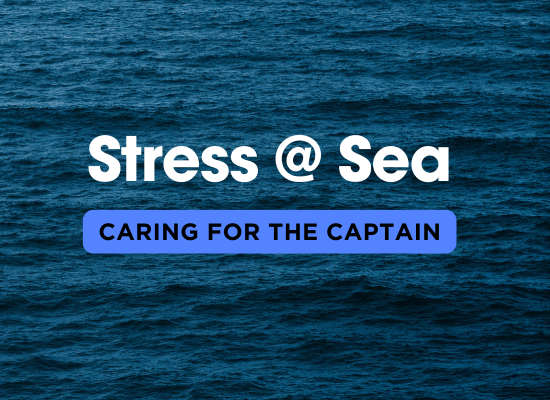Taking Care of the Captain: Strategies for Success and Well-Being at Sea

The role of a ship captain is one of immense responsibility and unparalleled challenge. As the highest-ranking officer on board, the captain is not only the leader but also the ultimate decision-maker in all situations, bearing the weight of the ship, its cargo, and the crew on their shoulders. Whether it’s navigating through treacherous waters or managing unexpected emergencies, the captain must constantly balance the safety of everyone on board with the demands of operational efficiency. This delicate balancing act requires not just expertise but also a resilient mindset, making the captain's role one of the most critical—and stressful—on any voyage.
Key Points
- Immense Responsibility: The captain is responsible for the overall safety and operation of the ship, ensuring that every decision made aligns with maritime laws and the best interests of the crew and cargo.
- High-Stakes Decision-Making: Captains must make crucial decisions in high-pressure situations, such as during storms, equipment failures, or medical emergencies, where the wrong call could have severe consequences.
- Balancing Safety and Efficiency: Captains must navigate the delicate balance between maintaining the safety of the crew and cargo and ensuring that the ship operates efficiently to meet its logistical goals.
Unique Stresses
Captains face unique stresses that set their role apart from any other position on a ship. These stresses, often compounded by the isolation of life at sea and the unrelenting demands of leadership, can take a significant toll on their mental and emotional well-being. From the loneliness that comes with long voyages away from family and friends to the constant state of alertness required to make life-and-death decisions, captains must navigate a complex web of pressures. In addition to managing their own stress, they are also responsible for maintaining the morale of the crew and ensuring compliance with stringent legal and regulatory requirements. Understanding these unique challenges is crucial for providing the support that captains need to thrive in their roles.
| ShipUniverse: Unique Stresses Faced by Captains | |
|---|---|
| Stress Factor | Description |
| Isolation and Loneliness | Captains often experience profound social isolation, especially during long voyages where contact with family and friends is limited. The lack of social interaction can lead to feelings of loneliness and depression, making it essential to address this aspect of their well-being. |
| Mental and Emotional Fatigue | The captain's role requires constant vigilance, as they are responsible for making critical decisions that can impact the safety of the ship and crew. This perpetual state of alertness can lead to significant mental and emotional fatigue, increasing the risk of burnout. |
| Responsibility for Crew Morale | Maintaining crew morale is a critical aspect of a captain's duties, yet it adds another layer of stress. Captains must ensure that the crew remains motivated and cohesive while also managing their own pressures, creating a challenging dynamic that requires strong leadership skills. |
| Legal and Regulatory Pressures | Captains must navigate a complex array of international maritime laws and regulations, ensuring compliance at all times. The responsibility of adhering to these regulations, along with the potential legal consequences of any infractions, adds significant stress to their role. |
Solutions for Managing Stress
Managing the immense stress that comes with being a ship captain is essential for both personal well-being and effective leadership. With the unique pressures captains face, tailored solutions are necessary to help them navigate these challenges. From mental health support designed specifically for the maritime environment to structured leave policies that prevent burnout, various strategies can be employed to mitigate stress. Creating peer support networks allows captains to share experiences and advice, while mindfulness practices and relaxation techniques can offer daily tools for managing stress. These solutions are crucial for ensuring that captains can continue to lead with clarity and confidence, even in the most demanding situations.
| ShipUniverse: Solutions for Managing Stress | |
|---|---|
| Solution | Description |
| Mental Health Support | Providing access to counseling services, stress management workshops, and mental health resources specifically tailored for captains can be invaluable. These services address the unique psychological demands of the role, offering support in a confidential and accessible manner. |
| Rotational Shifts and Leave Policies | Implementing rotational shifts and ensuring adequate shore leave can help prevent burnout. Balanced work schedules allow captains to rest and recharge, reducing the risk of chronic stress and its associated health issues. |
| Peer Support Networks | Creating networks or support groups where captains can share experiences and advice provides a sense of community and understanding. These networks offer a platform for discussing common challenges and finding solutions collectively, reducing the isolation often felt in the role. |
| Meditation and Relaxation Techniques | Encouraging mindfulness practices, relaxation techniques, and mental exercises can help captains manage stress on a daily basis. Techniques such as deep breathing, meditation, and guided relaxation can be easily integrated into their routines, offering a proactive approach to stress management. |
| Physical Fitness Programs | Introducing regular physical fitness programs or providing access to exercise facilities on board can greatly improve captains' physical and mental health. Exercise helps reduce stress, improves mood, and enhances overall well-being, making it a vital component of stress management. |
| Healthy Diet and Nutrition | Promoting a healthy diet and ensuring access to nutritious meals on board can have a significant impact on stress levels. Proper nutrition supports cognitive function and energy levels, helping captains stay alert and focused during long voyages. |
| Recreational Activities | Providing opportunities for recreational activities, such as hobbies, games, or social events, can offer captains a way to unwind and disconnect from the pressures of their role. Engaging in leisure activities helps to relieve stress and promotes a balanced lifestyle. |
| Regular Feedback and Communication | Maintaining open lines of communication between captains and ship operators or owners is essential for addressing concerns and providing support. Regular feedback sessions allow captains to voice their challenges and receive guidance, fostering a supportive work environment. |
| Access to Onboard Entertainment | Equipping the ship with a variety of entertainment options, such as movies, books, and music, helps captains relax during their downtime. Access to entertainment is crucial for mental well-being, offering a necessary escape from the demands of their duties. |
| Leadership Development Programs | Investing in leadership development programs that focus on stress management, communication skills, and resilience can empower captains to handle the pressures of their role more effectively. Ongoing training helps them stay confident and competent in their leadership abilities. |
| Technological Assistance | Leveraging advanced technology, such as automated systems and decision-support tools, can help reduce the cognitive load on captains. These tools assist with navigation, monitoring, and routine tasks, allowing captains to focus on more critical responsibilities with less stress. |
Improving the Onboard Environment
Creating a supportive and comfortable onboard environment is crucial for the well-being of ship captains, who often endure long voyages and high-stress conditions. By enhancing their living conditions, ensuring robust communication, promoting physical health, and providing leisure activities, captains can maintain better mental and physical health, leading to improved performance and job satisfaction.
Enhanced Living Quarters
- Comfort Amenities: Upgrading the captain’s quarters to include amenities such as ergonomic furniture, high-quality bedding, and climate control can make a significant difference in their ability to relax after long shifts. A comfortable and restful space is essential for recharging both mentally and physically.
- Privacy and Space: Ensuring that the captain has adequate privacy and personal space is important for their mental well-being. This can include soundproofing to minimize noise disruptions, a private bathroom, and a designated area for personal belongings.
Access to Quality Communication
- Reliable Communication Tools: Access to reliable communication tools is vital for captains who are often away from their families for extended periods. High-speed internet, satellite phones, and video calling capabilities allow captains to stay in touch with loved ones, which can alleviate feelings of loneliness and isolation.
- Emergency Communication Systems: In addition to personal communication, having dependable emergency communication systems is critical. This ensures that captains can effectively manage any crisis situations and maintain contact with relevant authorities.
Healthy Diet and Exercise
- Nutritious Food Options: Providing captains with access to a variety of nutritious meals is essential for maintaining their energy levels and cognitive function. Fresh fruits, vegetables, lean proteins, and whole grains should be readily available, with meal plans designed to meet the demands of their role.
- Exercise Facilities: Onboard exercise facilities, such as a gym or designated workout area, can greatly enhance a captain’s physical health. Regular exercise helps reduce stress, improves mood, and supports overall well-being. Simple equipment like treadmills, weights, and yoga mats can make a significant difference.
Entertainment and Leisure Options
- Entertainment Systems: Equipping the captain’s quarters with modern entertainment systems, such as a television, preloaded tablet, and a selection of movies and shows, can provide a much-needed mental break from their responsibilities. Audiobooks, music, and gaming consoles can also offer variety.
- Leisure Activities: Providing a range of leisure activities, such as board games, puzzles, and a small library of books, can help captains unwind during their downtime. These activities encourage relaxation and mental stimulation, contributing to a more balanced lifestyle.
Training and Development
Investing in the continuous training and development of ship captains is essential for their long-term success and well-being. By providing leadership training, stress management techniques, and opportunities for professional growth, captains can enhance their skills and remain resilient in the face of challenges.
Leadership and Stress Management Training
- Specialized Training Programs: Offering training programs that focus on leadership under pressure is crucial for captains who regularly face high-stakes situations. These programs should include modules on decision-making, crisis management, and maintaining composure in stressful environments.
- Stress Management Techniques: Incorporating stress management techniques into training programs can help captains develop coping strategies for the unique pressures of their role. Techniques such as mindfulness, deep breathing exercises, and mental resilience training can be valuable tools for maintaining mental health.
Continuous Professional Development
- Educational Opportunities: Providing opportunities for captains to engage in further education, such as advanced maritime courses or certifications, helps them stay sharp and confident in their role. Continuous learning ensures that captains remain up-to-date with the latest industry standards and practices.
- Workshops and Seminars: Regular workshops and seminars on topics such as new maritime technologies, environmental regulations, and leadership strategies can offer captains the chance to expand their knowledge and skills. These events also provide a platform for networking and sharing experiences with other maritime professionals.
Technology and Support
The support provided by ship owners and operators plays a pivotal role in the well-being and effectiveness of ship captains. Recognizing the captain's contributions and maintaining open communication can significantly enhance morale and job satisfaction. Additionally, leveraging technology solutions can help reduce the cognitive load on captains, enabling them to focus on critical tasks while automated systems manage routine operations. This comprehensive support system not only empowers captains but also ensures the smooth and efficient running of the ship.
| ShipUniverse: Support from Ship Owners, Operators, and Technology Solutions | |
|---|---|
| Support Element | Description |
| Recognition and Incentives | Recognizing the hard work and dedication of captains through awards, bonuses, and other incentives is crucial for maintaining high morale. These forms of recognition not only reward captains for their achievements but also motivate them to continue performing at their best. Incentives can include:
|
| Regular Feedback and Communication | Maintaining an open line of communication between captains and ship operators is essential for addressing concerns, providing guidance, and ensuring mutual understanding. Regular feedback sessions allow captains to discuss any issues they are facing and receive constructive feedback on their performance. Key aspects include:
|
| Tools for Decision Support | Implementing advanced navigation and decision-support systems can significantly reduce the cognitive load on captains. These tools provide real-time data and analysis, assisting captains in making informed decisions quickly and accurately. Important tools include:
|
| Automated Systems for Routine Tasks | Automation of routine tasks, such as engine monitoring, cargo management, and log keeping, allows captains to focus on more critical responsibilities. Automated systems can handle repetitive or time-consuming tasks with precision, reducing the risk of human error and freeing up the captain's time for strategic decision-making. Key areas of automation include:
|
Supporting ship captains is not just about recognizing their leadership but also about creating an environment that enables them to perform at their best, both mentally and physically. By investing in advanced technology, fostering open communication, providing meaningful incentives, and focusing on their well-being, ship owners and operators can ensure that captains are equipped to handle the unique challenges of their role. These efforts not only enhance the captain’s performance but also contribute to the overall safety, efficiency, and success of the ship. In the demanding world of maritime navigation, taking care of the captain is a crucial investment in the entire operation’s future.
| Additional Support Resources for Captains | |
|---|---|
| Organization | Support Offered |
| International Seafarers' Welfare and Assistance Network (ISWAN) | ISWAN provides a 24/7 helpline for seafarers, including captains, offering emotional support, practical advice, and emergency assistance. They also run mental health campaigns and provide resources on well-being. |
| The Mission to Seafarers | This organization offers practical, emotional, and spiritual support to seafarers around the world. They have a global network of chaplains, support centers, and a 24-hour helpline. |
| SeafarerHelp | SeafarerHelp provides free, confidential, multilingual helpline services available 24/7 to seafarers, including captains, and their families. They offer advice, support, and information on a wide range of issues. |

Do you have a Maritime Product or Service that may be of interest to Shipowners? Tell us about it here!
Do you have feedback or insights? Please reach out to editor @ shipuniverse.com



